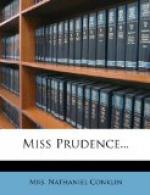“Oh, can’t you tell us?” entreated Linnet, forgetting her work.
“Not yet.”
“Does it concern us?” asked Marjorie.
“Yes, both of you.”
Two hours since it had “concerned” only Marjorie, but in this hour under the apple-tree Miss Prudence had been moved to include Linnet, also. Linnet was not Marjorie, she had mentally reasoned, but she was Linnet and had her own niche in the world. Was she not also one of her little sisters that were in the world and not of it?
“When may we know?” questioned Linnet
“That depends. Before I leave your grandfather’s, I hope.”
“I know it is something good and wonderful, because you thought of it,” said Marjorie. “Perhaps it is as good as one of our day-dreams coming true.”
“It may be something very like one of them, but the time may not be yet. It will not do you any harm to know there’s something pleasant ahead, if it can be arranged.”
“I do like to know things that are going to happen to us,” Linnet confessed. “I used to wish I could dream and have the dreams come true.”
“Like the wicked ancients who used to wrap themselves in skins of beasts and stay among the graves and monuments to sleep and dream—and in the temples of the idols, thinking the departed or the idols would foretell to them in dreams. Isaiah reproves the Jews for doing this. And Sir Walter Scott, in his notes to ‘The Lady of the Lake,’ tells us something about a similar superstition among the Scotch.”
“I like to know about superstitions,” said Linnet, “but I’d be afraid to do that.”
“Miss Prudence, I haven’t read ’The Lady of the Lake’!” exclaimed Marjorie.
“No, imitator of Buckle, you haven’t. But I’ll send it to you when I go home.”
“What did Buckle do with all his learning?” inquired Marjorie.
“I haven’t told you about half of his learning. He wrote a work of great learning, that startled the world somewhat, called ’The History of Civilization,’ in which he attempted to prove that the differences between nations and peoples were almost solely to be attributed to physical causes that food had more to do with the character of a nation than faith.”
“Didn’t the Israelites live on the same food that the Philistines did?” asked Marjorie, “and didn’t—”
“Are you getting ready to refute him? The Jews could not eat pork, you remember.”
“And because they didn’t eat pork they believed in one true God!” exclaimed Marjorie, indignantly. “I don’t like his book, Miss Prudence.”
“Neither do I. And we need not read it, even if he did study twenty-two thousand books and Johnson’s Dictionary to help him write it.”
“Why didn’t he study Webster?” asked Linnet.
“Can’t you think and tell me?”
“No.”
“Can you not, Marjorie?”
“Because he was English, I suppose, and Johnson wrote the English Dictionary and Webster the American.”




